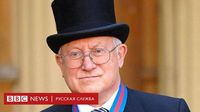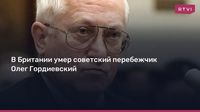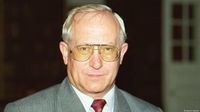Oleg Gordievsky, a former KGB colonel and MI6 agent, passed away at his home in Surrey, Great Britain, on March 21, 2025, at the age of 87. His death, not considered suspicious, marks the end of a significant chapter in the history of Cold War espionage.
Born in Moscow on October 10, 1938, into a family with deep connections to Soviet intelligence (his father served in the NKVD), Gordievsky showed early promise in the field of diplomacy and espionage. After graduating from the prestigious MGIMO university in 1962, he joined the KGB and ultimately became a key figure within the agency, overseeing operations in the UK and Scandinavia for over 15 years.
Gordievsky’s recruitment by British intelligence in 1972 fundamentally changed the course of his life and the Cold War. Operating under the pseudonym OVATION, he provided crucial intelligence to MI6, which helped the West understand the Soviet mindset during a time of heightened tensions. "He helped to change the course of the Cold War, explaining to Western structures what they really think in the USSR, and how best to communicate with the Soviet regime," noted analyses of his impact.
His efforts during the critical years of 1981-1983 were deemed instrumental in preventing potential nuclear conflict. In a revealing statement, Gordievsky reflected on his motivations, saying, "This was so outrageous that I decided – that’s it, I’ll stop working for this criminal terrible regime," referring to the 1968 Soviet invasion of Czechoslovakia.
In 1985, after MI6 had learned that Soviet intelligence was closing in on him, Gordievsky was recalled to Moscow under suspicion of treason. However, with the aid of British diplomats, he executed a daring escape, smuggling himself to Finland in the trunk of a diplomatic car. His intelligence work earned him a death sentence in absentia back in the USSR, but he found refuge in Britain.
Settling in Surrey, Gordievsky continued to advise Western intelligence agencies and authored several books detailing his experiences, including "Next Stop Execution," published in 1995. He received numerous accolades for his contributions, most notably the Order of St. Michael and St. George in 2007 from Queen Elizabeth II for his services to the national security of the UK.
In recent years, Gordievsky lived under police protection, wary of potential retribution from Russian agents. Despite his high-profile status and previous assassination attempts, he expressed concerns for his safety, especially after the murder of fellow ex-KGB agent Alexander Litvinenko in 2006. "I feel that one day they will find a way to harm me, yes," he remarked, illustrating the constant threat he faced.
However, following his death, investigations did not reveal any suspicious circumstances surrounding his passing, although the counter-terrorism police joined the coroner in examining the situation. Gordievsky was aware that the Russian Federation holds a grudge against individuals who disclose state secrets, indicating the precarious nature of his existence during his latter years.
In addition to his intelligence work, Gordievsky played a vital role in fostering diplomacy between the East and the West, including facilitating Mikhail Gorbachev's historic visit to the UK in 1984. His legacy as a double agent remains profound, shaping the narrative of espionage during the Cold War. As one analyst put it, "The sheer volume of classified information he provided to the British gave them a significant advantage over Soviet operations."
Oleg Gordievsky's life exemplifies the complexities of espionage and the personal sacrifices made by those who operate in the shadows, forever impacting the dynamics of international relations. His story continues to resonate, serving as a compelling reminder of the tension-filled era of the Cold War and the pivotal figures who navigated its treacherous waters.






